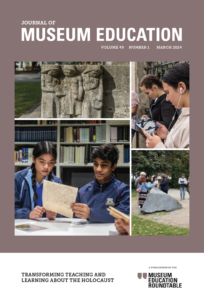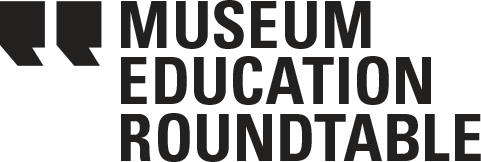Context and Transformation: Making Visible the Work of the Museum Education Roundtable
 The Journal of Museum Education (JME) celebrated its 50th anniversary last year, culminating in the final issue of 2023, Relational. The theme of this issue was the various ways museum educators share, support, and sustain professional praxes and the role the JME plays in making visible the often invisible labor of practitioners. Now, at the start of our 51st year of publishing on the theory, training, and practice of the museum education field, how will we approach the next chapter as a journal and a professional organization?
The Journal of Museum Education (JME) celebrated its 50th anniversary last year, culminating in the final issue of 2023, Relational. The theme of this issue was the various ways museum educators share, support, and sustain professional praxes and the role the JME plays in making visible the often invisible labor of practitioners. Now, at the start of our 51st year of publishing on the theory, training, and practice of the museum education field, how will we approach the next chapter as a journal and a professional organization?
The introduction of this new editorial section “From the Board” is one significant way the Museum Education Roundtable (MER) is intending to make the invisible work of the organization visible to readers today and throughout the next fifty years. That work includes how we actualize our mission, vision, and commitment to diversity, equity, accessibility, and inclusion (DEAI) in the conceptualization and execution of our board values, work culture, structure, policies, and processes that allow us to produce this journal in service to the field. This desire for greater transparency is part of an intentional shift in the organization since 2018 to identify the gaps between external statements about our commitment to DEAI and internal workings, to engage in honest reflections and critical discussions about those gaps, and to transform our organization and build a community from within in order to produce a journal that reflects, challenges, and forecasts the role of museum educators today and beyond.
We recognize this ongoing work as an organization is not easy and does not happen in a vacuum. We have a professional responsibility to address the intersecting histories of oppression and resistance that shape hierarchies of privilege and power on individual, institutional, and systemic levels and their role in museum education. When our consciousness is raised to the interlocking systems of oppression and our humanity is tested by inhumane and unjust events, what is the role of museum educators in advancing peace, justice, and liberation? How do we put “knowledge in action,” as per MER’s motto, as a knowledge-producing organization and a community of practice for museum educators?
In particular, this JME issue on Holocaust education, while the articles were conceived and written before the October 7, 2023 attack by Hamas on Israel, is scheduled to be published after months of bombardment by Israel Defense Forces on Palestinian civilians in Gaza. The historical context that precipitated this attack and the oppressive forces of antisemitism and Islamophobia have increasingly shaped social interactions, news and social media, and institutional responses from micro to macro levels. We, as individuals and as an organization, have been greatly tested by these events. At our fall board meeting and since, we have reflected and discussed our role as a knowledge-producing organization, our professional responsibility as we’ve defined it, and how we can move beyond performative platitudes to support museum educators globally in this moment and into the future using our publication, communications platforms, and community-building resources.
If we aim to advance peace, justice, and liberation as museum educators, we have a role to play through our relationships, work, and writing to combat dehumanizing narratives stemming from the colonial roots of museums, to connect with our humanity as practitioners and as intermediaries between the museum and the public, to recognize the possibilities and limitations of our field and institutions, and much more. As an organization, we intend to continue this work through ongoing critical reflection of internal power dynamics, structural inequities, and procedural barriers; iterating our ways of working responsively to support risk-taking and transformation; and perceiving failure and disagreement as opportunities to learn and practice bravery. This work is not easy nor should it be. Closing the gap between intention and impact has required us to have difficult discussions, alter approaches, and seek consensus. As a journal, we will continue to address the barriers and challenges inherent in knowledge production that centers Western values, modes of production, and narrative structures; challenge the binaries of practitioner and scholar; and introduce different article formats that welcome the incredible creativity and criticality of museum educators. We are looking for museum educators to join us in this work as authors, guest editors, peer reviewers, JME readers, and MER members so please reach out to us.

